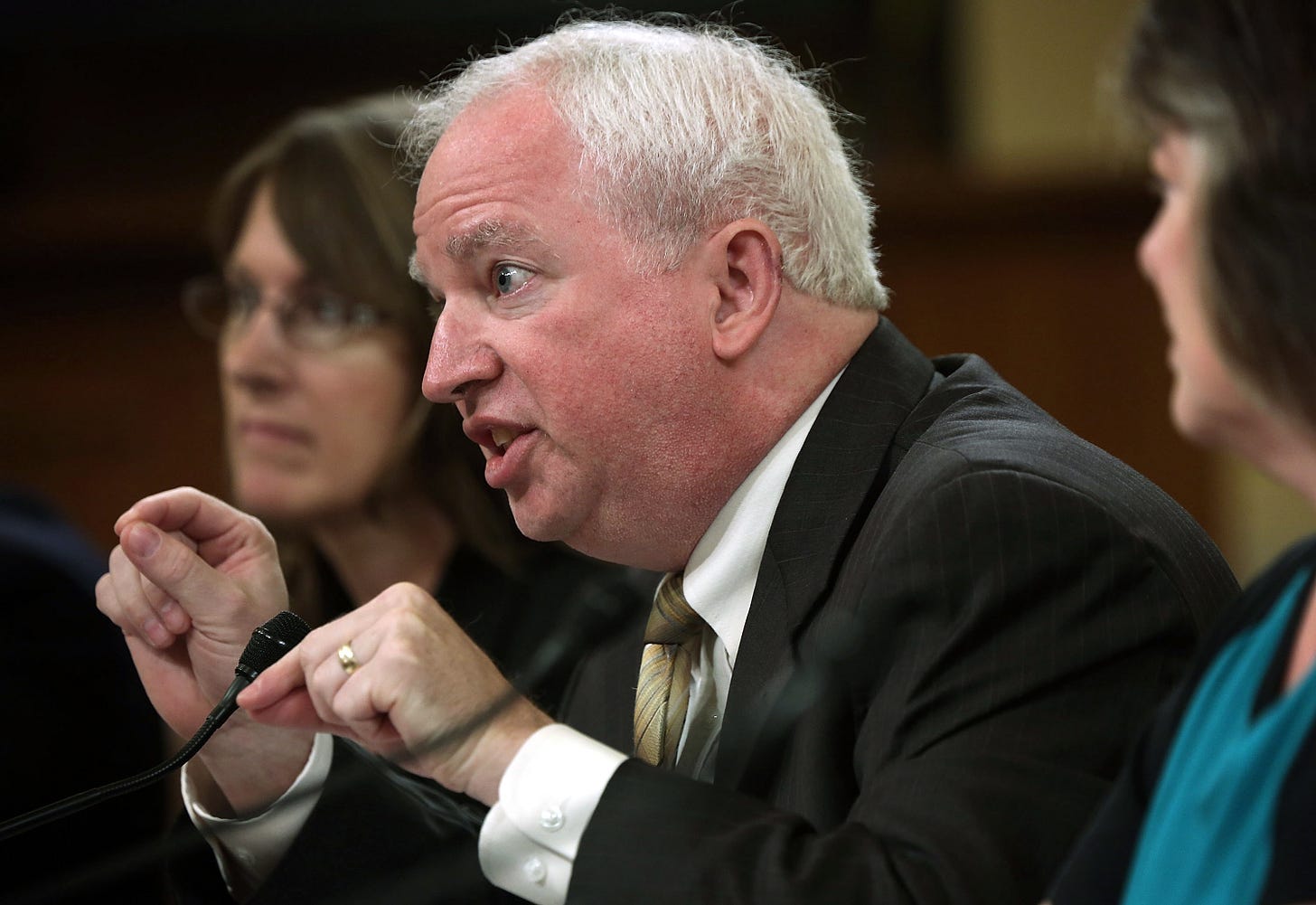Coup-Proof the Electoral Process Before 2024
Passing the proposed bipartisan reform of the Electoral Count Act should be Congress' top priority

There were many sources of mischief on Jan. 6, 2021, but at the heart of the crisis was an antiquated, 19th century law called the Electoral Count Act governing the intricate procedures for casting and counting Electoral College votes. So, it’s good news that a bipartisan group of senators—nine Republicans and seven Democrats—led by Susan Collins, a Republican from Maine, and Joe Manchin, a Democrat from West Virginia, recently released their draft proposal to reform this law, called the Electoral Count Reform Act (ECRA).
Updating the Electoral Count Act has been a priority for many scholars and organizations across the political spectrum in the aftermath of the attack on the Capitol. ECRA represents a promising first step that, if enacted, will strengthen the guardrails against partisan malfeasance. In effect, it is an exercise in Madisonian checks and balances, ensuring that the states, courts and Congress all operate in their properly defined spheres while preventing each one from running amok.
“Enacted Prior To Election Day”
One of the most important changes in ECRA is aimed at John Eastman, the constitutional law professor behind Donald Trump’s cockamamie theories to stay in power, and his spurious argument that state legislatures have “plenary power” to overturn the election results in their respective states—and not merely in instances of alleged fraud but for any number of reasons.
State legislatures do, as a constitutional matter, have very wide leeway to decide how their state will pick its Electoral College members, who then elect the president and vice president. That includes, among other things, whether the electors will be chosen pursuant to a popular vote in state elections at all—although no state has done it any other way since 1876. (For a step-by-step account of the Electoral College process, read my previous piece at The UnPopulist.)
However, Congress has an important check on this state legislative authority: the power to decide the time when the rules for choosing the electors have to be in place. That time is Election Day. After that, state legislators have no further say in the matter. State legislatures have no discretion in retroactively changing these rules after the elections.
ECRA affirms this important principle in a couple ways. First, throughout the bill, repeated references to state laws “enacted prior to Election Day” have been inserted. This important addition would leave no doubt that state law as it stood on that date is decisive, and legislatures can’t convene to change those laws after the fact.
Second, ECRA also revises the “failed elections” provision, which has sometimes been used to argue that a state legislature can endorse bogus claims of fraud and render the state’s election effectively null and void. And then because the election has “failed to produce an outcome,” the legislature becomes empowered to take matters into its own hands. This argument was advanced by Eastman in the 2020 election, and it also played a role in the disputed 2000 election in Florida, though no state legislature in either case invoked it.
ECRA would make the common understanding clear, namely, that this provision is intended only to cover major natural disasters and the like. And in such cases the states may only proceed according to the previously enacted laws for extending an election due to an emergency. Any claims of fraud have to be resolved in the courts, not by the legislature.
Rogue Governors and the Judicial Check
After each state has conducted its election, courts have resolved any claims of fraud or other complaints, and state election officials have validated the result, a key step in the process is that the governor of the state has to certify the appointment of the presidential electors from the winning party’s slate and dispatch their names to the National Archives and Congress. These electors meet in their respective state capitals in December to cast their votes, and it is those electoral votes that the vice president opens in the joint session of Congress in January. If any governor refuses to certify the electors, the process might grind to a halt.
This is why Trump put immense pressure on a number of governors, including those in Arizona and Pennsylvania, to break the law and refuse to certify the electors for Joe Biden. He didn’t succeed. But the 2022 GOP gubernatorial nominee in Arizona is Kari Lake and in Pennsylvania Doug Mastriano. Both of them have fully embraced Trump’s “Big Lie” and declared that they would not have certified Biden’s electors in 2020. Should they win, Trump will be able to count on them to do his bidding in 2024.
ECRA addresses this possibility by creating a kind of judicial backstop mechanism, a break-glass-in-case-of-emergency procedure to handle rogue governors who either try to certify the wrong electors or refuse to certify the right electors. How? It sets a firm deadline requiring the state to certify its electors six days before the Electoral College is scheduled to meet and vote.
If a recalcitrant governor has not provided the needed certifications by then, three judges would be empaneled to decide the matter without delay, with a possible appeal directly to the Supreme Court. If the governor still refuses to follow a court order, the court could order an alternative state official such as the secretary of state or the chief civil servant in the state’s elections agency to provide the certification. Firm limits on state legislatures’ powers to make election rules combined with fixed deadlines for certifying elections will considerably reduce the scope for partisan chicanery.
Once this process has played out and the proper certification has been issued, ECRA stipulates that the result “shall be conclusive” and Congress would be bound by it in determining who the state had appointed as its electors. This respects the proper constitutional principles: Deciding whom a state has chosen as its electors is a function of state law to be adjudicated through the courts. It is not a matter within Congress’ purview to second-guess.
Congress and the Vice President
Once the duly chosen electors have met and cast their votes in December, those votes are then sent to be formally opened by the vice president and counted during a joint session of Congress, as required by the 12th Amendment.
It is this part of the process that has proven to be the biggest failing of the existing Electoral Count Act, which allows members of Congress to make contrived objections far beyond Congress’ legitimate role during the count. These objections haven’t only come from the Republican side, either. Democrats also made ill-founded challenges to counting electoral votes in 2000, 2004 and 2016. And, of course, it was the theory that Congress had the power to overturn the results of the election—also touted by Eastman—that fueled the mob attack on the Capitol.
ECRA would firmly repudiate these antics. First, the bill would contain an explicit provision stating that the vice president has no unilateral authority over the proceedings and cannot decide which votes to open and count. Instead, the role of the vice president would be purely ceremonial. This is already the near-universal interpretation of existing law, but codifying it will leave no room for doubt—or mischief.
More substantively, ECRA would also make it more difficult to make baseless objections to a state’s electoral votes for purposes of political grandstanding. The current law allows merely one member of the House together with one Senate co-sponsor to raise an objection. And once they do, both houses are forced to adjourn to their respective chambers to debate and vote. It was this provision that Republican Sens. Ted Cruz of Texas and Josh Hawley of Missouri, along with some House Republicans, used to question the votes of Arizona and Pennsylvania. ECRA would raise that threshold to one-fifth of each body—87 representatives and 20 senators—to question any state’s electoral votes. For comparison, only eight senators voted for one or both of the objections in 2020.
In the vast majority of plausible cases, this would ensure that the electoral count would proceed as a mere formality and Congress would not entertain ill-founded attempts to change the outcome.
Room for Improvement
While the ECRA draft is very good, there is still room for improvement on some matters. One concern is that ECRA mostly retains the current law’s language about the permissible grounds for objections in Congress, namely, that the electors were not “lawfully certified” or that their electoral votes were not “regularly given.” These terms of art were intended to encompass the proper limits on Congress’ power by limiting objections to only a few specific constitutional rules, such as ensuring that the electors voted on the day required and cast their votes for eligible candidates.
However, in practice such vague terms have allowed all kinds of specious objections to be aired, from conspiracy theories about voting machines to complaints about state court rulings. These dilute the general principle that Congress should not consider objections to the popular election results in each state (which should have been resolved in the courts long before the votes reached Congress, anyway).
Other possible tweaks include more sharply circumscribing the “failed elections provision” to cover only genuinely catastrophic emergencies that make it hard for elections to proceed as scheduled on Election Day—and not allegations of fraud or a disputed result. The trigger for the three-judge panel procedure also needs to be slightly reworked to ensure it covers all the intended scenarios and does not go further than that to displace existing avenues for post-election litigation. (My Cato colleague Thomas Berry has cataloged some more concerns here, and I’ve described some others in my own review of ECRA.)
ECRA: The Right Solution
That said, the bottom line is that ECRA would be an immense improvement over the current law and would greatly reduce the risk of a disastrous constitutional crisis or successful election subversion.
It is rare to find such broad agreement on something so contentious as the Jan. 6th insurrection and its aftermath. While it is hazardous to prognosticate any bill’s fate in Congress, so far the reactions have been enthusiastic in both parties. Points of debate have instead mostly focused on fine-tuning the details, with very little outright opposition to the overall goal.
For all those worried about a possible repeat or worse of the 2020 election fiasco, the Electoral Count Reform Act is a welcome breath of fresh air. Getting it done this year should be an urgent priority in Congress.
© The UnPopulist, 2022
Follow us on Bluesky, Threads, YouTube, TikTok, Facebook, Instagram, and X.
We welcome your reactions and replies. Please adhere to our comments policy.







“Getting it done this year should be an urgent priority in Congress.” Why this year instead of after the new Congress convenes in 2023?
Your closing sentence implies that it is an “urgent priority” to prevent the voters in this November's elections from having a say in the matter. Instead, why not make support for the proposal an issue in this year's elections? Please explain.